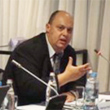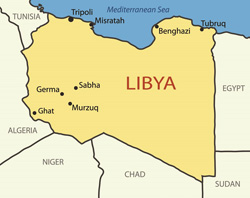Non-alignment Policy as a Principle of Shaping the National Security of Azerbaijan[Over]  By professor Sadi Sadiyev Saleh, War College of the Armed Forces, Republic of Azerbaijan By professor Sadi Sadiyev Saleh, War College of the Armed Forces, Republic of Azerbaijan
The emergence of a bipolar world and the formation of two military blocks (NATO and the Warsaw Pact) after the Second World War ushered in an intense rivalry between different countries. Finding an effective grand strategy to survive between two hostile powers inevitably requires a balanced policy. In this context, the underdeveloped countries felt the need to join efforts for the common defence of their interests, to strengthen their independence and sovereignty and to express a strong commitment for peace by declaring themselves as “non-aligned” from either of the two nascent military blocks. READ MORE
- Thursday, 14 February 2019, 20:25
Is America Changing the European Power Play?[Over]  By George Vlad Niculescu, Head of Research, the European Geopolitical Forum
By George Vlad Niculescu, Head of Research, the European Geopolitical Forum
When at the NATO summit in Brussels, on 25 May 2017, president Donald Trump didn’t say that one sentence committing America to continue standing by article 5 of the NATO Charter, he raised eyebrows across Europe. At that time, everyone remembered that candidate Donald Trump raised serious suspicions that his presidency might lead to the end of the West, as we knew it. Nevertheless, everyone who has ever believed in the strength of the Trans-Atlantic link and in the soft power of the Euro-Atlantic values secretly hoped that the end of Pax Americana in Europe wasn’t that close. READ MORE
- Tuesday, 3 July 2018, 10:33
Armenia’s “Velvet Revolution” and the Karabakh Conflict Resolution[Over]  By George Vlad Niculescu, Head of Research, the European Geopolitical Forum
By George Vlad Niculescu, Head of Research, the European Geopolitical Forum
On 17 April 2018, Armenia’s National Assembly overwhelmingly voted to install Serzh Sargsyan -former president of the country- as prime minister. They unequivocally ignored the “voice of the street” calling for a change of face at the helm of this rather small, but ambitious post-Soviet state. This vote was supposed to conclude a power capture scheme started back in 2015.[…] Under pressure from independent civil society, then president Sargsyan had promised not to turn up as candidate for the prime-ministerial post. READ MORE
- Wednesday, 9 May 2018, 20:20
The Turkmenistan-Pakistan strategic partnership gathers momentum: as the great 'gas game' in Eurasia comes closer to a final realization [Over]  By Mehmood-Ul-Hassan Khan, EGF Associated Expert on South Asian geopolitics, By Mehmood-Ul-Hassan Khan, EGF Associated Expert on South Asian geopolitics,
The view from Lahore, Pakistan
Turkmenistan and Pakistan traditionally enjoy close, cordial relations marked by trust and understanding. Bilateral collaboration is growing steadily in a number of sectors. Indeed, on January 15-16, 2018 one of Turkmenistan's most prominent political figures, Rashid Meredov, conducted an official visit to Pakistan. READ MORE
- Monday, 12 February 2018, 18:42
The Black Sea-Caspian Region in Post-Conflict Energy Security Cooperation Scenarios[Over]  By Elkhan Nuriyev, BREC Global Energy Associate, EGF Affiliated Expert By Elkhan Nuriyev, BREC Global Energy Associate, EGF Affiliated Expert
This opinion piece applies post-conflict scenario planning to the future of the regional energy security cooperation in the Black Sea-Caspian basin and describes collaborative steps that could be taken by all relevant players to think more deeply about promoting the integration of energy markets in this part of the world.
Notwithstanding the most acute unpredictability of the new societies in Eastern Europe, the South Caucasus and Central Asia in the 1990s, the young states simultaneously faced the need for intense capital investments in their energy sectors that could drive economic growth. Since then, both the Black Sea and the Caspian basin alike have become crossroads for increased commerce and economic development as the old Silk Road is revived. READ MORE
- Monday, 2 October 2017, 21:25
The South-West Transport Corridor Project and the Geopolitical Reshaping of the South Caucasus[Over]
 By Fuad Shahbazov, Expert-advisor, Center for Strategic Studies under the President of the Azerbaijan Republic By Fuad Shahbazov, Expert-advisor, Center for Strategic Studies under the President of the Azerbaijan Republic
Baku hosted the first joint gathering of the heads of the railway administrations of Iran, Azerbaijan, Georgia, Ukraine and Poland, on June 19. The meeting was dedicated to the newly-launched “South-West Transport Corridor,” which links into the broader Trans-Caspian International Route project launched in 2016. READ MORE
- Thursday, 20 July 2017, 13:21
New Russian Order in the Middle East?[Over]  By Dr.Cyril Widdershoven, EGF Affiliated Expert, Military geopolitics By Dr.Cyril Widdershoven, EGF Affiliated Expert, Military geopolitics
Military environment in the Mediterranean is changing according to the chess plans of Russia’s leader Vladimir Putin. After bridging the immense opposition Russia was encountering during and after the demise of the USSR, a new Russian influence sphere has been built up of unforeseen order. It how the situation is perceived by Western leaders and military experts.
Re-emergence of Russian military assets and bilateral and multilateral relations with Arab countries is now being substantiated by the set-up of new military alliances in and around the Mediterranean. READ MORE
Any Optimism in the Chinese ‘Rooster Year'?[Over]  Mehmet Ogutcu
Mehmet Ogutcu
EGF Affiliated Expert
LONDON - As the world is preparing to leave 2016 behind as a year fraught with political surprises, financial crises and market volatility, governments and businesses including those in Turkey have started to set their eyes on what the next 12 months have in store for them politically and economically.
Clearly, global risks are more elevated and more interconnected than we have ever seen before and demand a proactive and integrated response to address potential impacts. To refresh your memory, since the end of the Bretton Woods order in the 1970s, there have been serious financial crises every seven years over the past 40 years: 1987, 1997, 2007. If you ask me whether the global crisis which has been brewing in the last few years could erupt in 2017, my answer would be yes. READ MORE
- Tuesday, 7 March 2017, 10:09
|
|